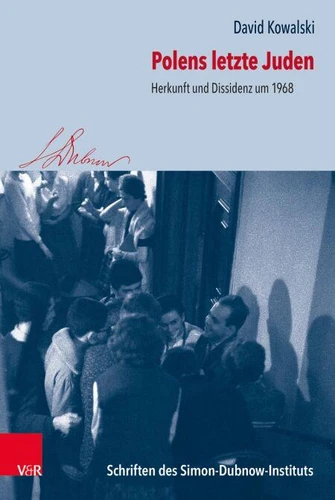Polens letzte Juden. Herkunft und Dissidenz um 1968
Par : ,Formats :
Disponible dans votre compte client Decitre ou Furet du Nord dès validation de votre commande. Le format PDF est :
- Compatible avec une lecture sur My Vivlio (smartphone, tablette, ordinateur)
- Compatible avec une lecture sur liseuses Vivlio
- Pour les liseuses autres que Vivlio, vous devez utiliser le logiciel Adobe Digital Edition. Non compatible avec la lecture sur les liseuses Kindle, Remarkable et Sony
 , qui est-ce ?
, qui est-ce ?Notre partenaire de plateforme de lecture numérique où vous retrouverez l'ensemble de vos ebooks gratuitement
Pour en savoir plus sur nos ebooks, consultez notre aide en ligne ici
- Nombre de pages248
- FormatPDF
- ISBN978-3-647-37068-2
- EAN9783647370682
- Date de parution14/05/2018
- Protection num.pas de protection
- Taille2 Mo
- Infos supplémentairespdf
- ÉditeurVandenhoeck & Ruprecht
Résumé
Warsaw, 1968. Students are protesting against the Polish state and party leadership. They are not advocating the abolition of Socialism, but rather the fulfillment of its promises. Many of the young protestors, including Irena Grudzinska, Adam Michnik, and Jan T. Gross, come from Jewish families. However, only a few of them identify with Judaism, seeing themselves rather as Polish patriots and as Communists.
Nevertheless, their origins are implicitly evoked in their protests. David Kowalski's study examines the meaning of this belonging in the early opposition movement. Reaching back to the interwar period, he illuminates the experiences of the generation preceding the dissidents of 1968, examines the repercussions of the Holocaust, and demonstrates the interconnections of origins, Communist hopes, and Socialist disappointments.
Nevertheless, their origins are implicitly evoked in their protests. David Kowalski's study examines the meaning of this belonging in the early opposition movement. Reaching back to the interwar period, he illuminates the experiences of the generation preceding the dissidents of 1968, examines the repercussions of the Holocaust, and demonstrates the interconnections of origins, Communist hopes, and Socialist disappointments.
Warsaw, 1968. Students are protesting against the Polish state and party leadership. They are not advocating the abolition of Socialism, but rather the fulfillment of its promises. Many of the young protestors, including Irena Grudzinska, Adam Michnik, and Jan T. Gross, come from Jewish families. However, only a few of them identify with Judaism, seeing themselves rather as Polish patriots and as Communists.
Nevertheless, their origins are implicitly evoked in their protests. David Kowalski's study examines the meaning of this belonging in the early opposition movement. Reaching back to the interwar period, he illuminates the experiences of the generation preceding the dissidents of 1968, examines the repercussions of the Holocaust, and demonstrates the interconnections of origins, Communist hopes, and Socialist disappointments.
Nevertheless, their origins are implicitly evoked in their protests. David Kowalski's study examines the meaning of this belonging in the early opposition movement. Reaching back to the interwar period, he illuminates the experiences of the generation preceding the dissidents of 1968, examines the repercussions of the Holocaust, and demonstrates the interconnections of origins, Communist hopes, and Socialist disappointments.



